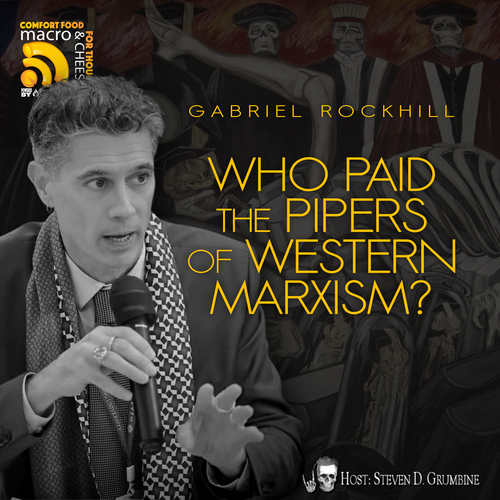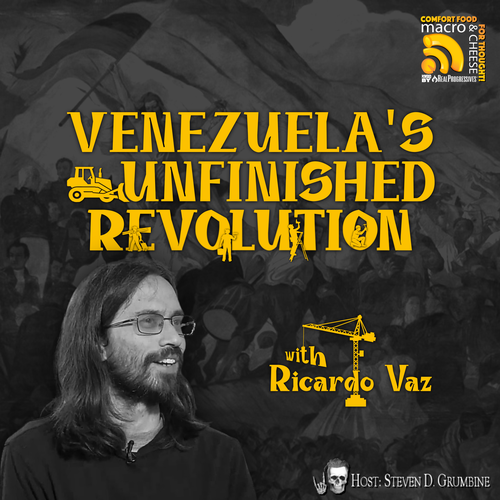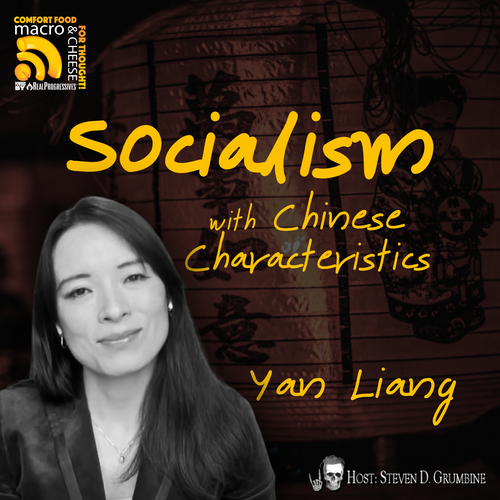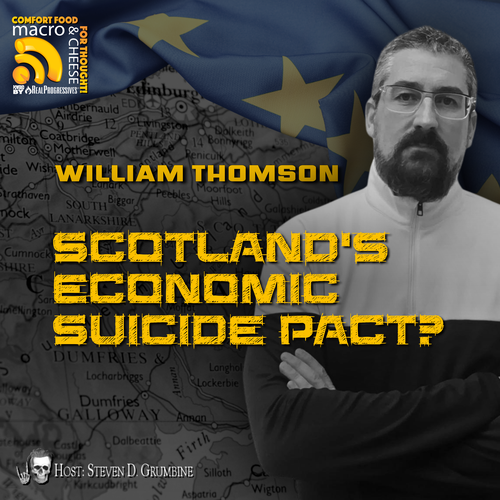Episode 256 – RP Live Presents: Confronting Green Colonialism with Hamza Hamouchene
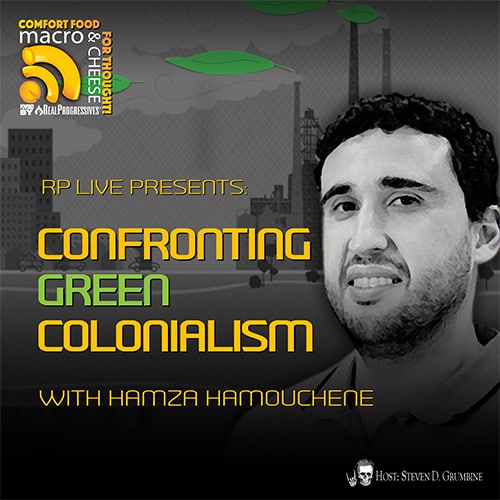
FOLLOW THE SHOW
A webinar from the RP Live series, featuring Dr Hamza Hamouchene and a presentation from his book, Dismantling Green Colonialism: Energy and Climate Justice in the Arab Region.
“We cannot talk about colonialism, green or otherwise, about dismantling it, about decolonization, about environmental and climate justice in the Arab region, and turn a blind eye to the ongoing genocide, the ethnic cleansing, the mass displacement, the mass slaughter and the repression of Palestinians perpetrated by the racist apartheid settler colonial state of Israel with the active support and abetting by imperialist powers — from the United States to the European Union, to France, to Germany, and others.”
In this webinar from our RP Live webinar series, Dr. Hamza Hamouchene addresses the fraudulent and exploitative reality behind “green energy.” His presentation comes from the recently published book, Dismantling Green Colonialism: Energy and Climate Justice in the Arab Region. The presentation is followed by questions from attendees.
Hamza’s analysis of regional and global climate and energy politics is illustrated by real-life examples from Indonesia, Morocco, Egypt, Libya, Tunisia, and other nations.
He explains how the commodification of nature and the environment is masked under the guise of proactive ‘green’ efforts — while the consequences include increased privatization and plundering of resources in the Global South.
Hamza stresses the importance of climate reparations, climate justice, and decolonization, but without an analysis of capitalism and a commitment to systemic change, solutions will always be inadequate and doomed to failure.
Dr Hamza Hamouchene is a London-based Algerian researcher-activist, commentator and a founding member of Algeria Solidarity Campaign (ASC), Environmental Justice North Africa (EJNA) and the North African Food Sovereignty Network (Siyada). He is currently the Arab region Programme Coordinator at the Transnational Institute (TNI). His work is focused on issues of extractivism, resources, land and food sovereignty as well as climate, environmental, and energy justice in the Arab region.
@BenToumert on Twitter
Due to the length of this webinar, we will not be providing an edited transcript.
If needed, you can find an auto-generated transcript as well as timestamped bookmarks on the YouTube video version of the webinar.
“Imperialism is a system of exploitation that occurs not only in the brutal form of those who come with guns to conquer territory. Imperialism often occurs in more subtle forms, a loan, food aid, blackmail.”
Thomas Sankara
GUEST BIO
Dr Hamza Hamouchene is a London-based Algerian researcher-activist, commentator and a founding member of Algeria Solidarity Campaign (ASC), Environmental Justice North Africa (EJNA) and the North African Food Sovereignty Network (Siyada). He is currently the Arab region Programme Coordinator at the Transnational Institute (TNI). His work is focused on issues of extractivism, resources, land and food sovereignty as well as climate, environmental, and energy justice in the Arab region. He is the author/editor of four books: “Old Wells and the new colonialism: the challenges of climate change and a just transition in North Africa” (2022), “The Arab Uprisings: A decade of struggles” (2022), “The Struggle for Energy Democracy in the Maghreb” (2017) and The Coming Revolution to North Africa: The Struggle for Climate Justice (2015). He also contributed chapters to various books including “The Oxford Handbook of Economic Imperialism” (2022), “The Routledge Essential Guide to Critical Development Studies” (2021), “Fanon Today: Reason and Revolt of the Wretched of the Earth” (2021), “A Region in Revolt: Mapping the Recent Uprisings in North Africa and West Asia” (2020), “The Palgrave Encyclopaedia of Imperialism and Anti-Imperialism” (2016) and “Voices of Liberation: Frantz Fanon” (2014). His other writings have appeared in Africa Is A Country, the Guardian, Middle East Eye, Counterpunch, New Internationalist, Jadaliyya, openDemocracy, ROAR magazine, Pambazuka, Nawaat, El Watan and the Huffington Post.
https://www.tni.org/en/profile/hamza-hamouchene
Dr Hamouchene’s Twitter is @BenToumert
PEOPLE MENTIONED
Fadhel Kaboub
is an Associate Professor of economics at Denison University, the President of the Global Institute for Sustainable Prosperity, and is currently working with Power Shift Africa in Nairobi, Kenya.
Before settling at Denison in 2008, Dr. Kaboub taught at Simon’s Rock College of Bard and at Drew University where he also directed the Wall Street Semester Program. He has held research affiliations with the Levy Economics Institute, the Economic Research Forum in Egypt, the John F. Kennedy School of Government at Harvard University, and the Center for Full Employment and Price Stability at the University of Missouri, Kansas City (UMKC).
Ndongo Samba Sylla
is a Senegalese development economist. He has previously worked as a technical advisor at the Presidency of the Republic of Senegal and is Programme manager at the West Africa office of the Rosa Luxemburg Foundation. His interests include Fair Trade, labor markets, democratic theory and monetary sovereignty. He holds a PhD. from the University of Versailles (UVSQ).
https://bookshop.org/search?keywords=Ndongo+samba+sylla
Greta Thunberg
is a Swedish environmental activist known for challenging world leaders to take immediate action for climate change mitigation.
https://www.bbc.com/news/world-europe-49918719
David Harvey
is a British Marxist economic geographer, podcaster, author, and Distinguished Professor of anthropology and geography at the Graduate Center of the City University of New York (CUNY).
https://en.wikipedia.org/wiki/David_Harvey
“This ecological and climate crisis does not happen in vacuum. It intersects with other forms of crisis: the food crisis, the energy crisis, the socioeconomic crisis, and the political crisis. I don’t think we can understand or talk about the ecological crisis without grappling with the capitalist extractivist model of development that has been imposed on the region since colonial times by imperialism.”
Hamza Hamouchene, Macro N Cheese Episode 256, RP Live Reheat, “Confronting Green Colonialism”
INSTITUTIONS / ORGANIZATIONS
European Union (EU)
The evolution of what is today the European Union (EU) from a regional economic agreement among six neighboring states in 1951 to today’s hybrid intergovernmental and supranational organization of 27 countries across the European continent stands as an unprecedented phenomenon in the annals of history.
https://www.cia.gov/the-world-factbook/countries/european-union/
https://european-union.europa.eu/index_en
Intergovernmental Panel on Climate Change (IPCC)
is the United Nations body for assessing the science related to climate change.
World Bank
is an international financial institution that provides loans and grants to the governments of low- and middle-income countries for the purpose of pursuing capital projects. The world bank operates on a sectorial basis while the IMF concerns itself with macro goals.
https://en.wikipedia.org/wiki/World_Bank
International Monetary Fund (IMF)
is a major financial agency of the United Nations, and an international financial institution claiming it’s mission to be “working to foster global monetary cooperation, secure financial stability, facilitate international trade, promote high employment and sustainable economic growth, and reduce poverty around the world.” The IMF concerns itself with macro goals, while the World Bank operates on a sectorial basis.
https://en.m.wikipedia.org/wiki/International_Monetary_Fund
African Development Bank
Founded in 1964 by the Organization of African Unity (predecessor of the African Union), AfDB is a multilateral development finance institution headquartered in Ivory Coast providing financial services to African governments and private entities investing in the region.
BRICS
The acronym began as a somewhat optimistic term to describe what were the world’s fastest-growing economies at the time. But now the BRICS nations — Brazil, Russia, India, China, South Africa — are setting themselves up as an alternative to existing international financial and political forums.
https://www.dw.com/en/a-new-world-order-brics-nations-offer-alternative-to-west/a-65124269
https://www.silkroadbriefing.com/news/2023/03/27/the-brics-has-overtaken-the-g7-in-global-gdp/
Pluto Press
Established in 1969, Pluto Press is an independent publisher of radical, left‐wing non‐fiction books.
GIZ
https://www.giz.de/en/aboutgiz/profile.html
Blue Carbon
EVENTS
Energy Charter Treaty
provides a multilateral framework for energy cooperation and is designed to promote energy security through the operation of more open and competitive energy markets, while respecting the principles of sustainable development and sovereignty over energy resources. Signed in December 1994 and entered into legal force in April 1998 the treaty currently includes fifty-three signatories and contracting parties from Europe and Asia.
https://www.energycharter.org/process/energy-charter-treaty-1994/energy-charter-treaty/
2016 United Nations Climate Change Conference
was an international meeting of political leaders and activists to discuss environmental issues. It was held in Marrakech, Morocco, on 7–18 November 2016. The conference incorporated the twenty-second Conference of the Parties (COP22), the twelfth meeting of the parties to the Kyoto Protocol (CMP12), and the first meeting of the parties to the Paris Agreement (CMA1). The purpose of the conference was to discuss and implement plans about combatting climate change and to “[demonstrate] to the world that the implementation of the Paris Agreement is underway”.
https://en.wikipedia.org/wiki/2016_United_Nations_Climate_Change_Conference
2022 United Nations Climate Change Conference
is more commonly referred to as COP27, and was the 27th United Nations Climate Change conference, held from 6 November until 20 November 2022 in Sharm El Sheikh, Egypt. It took place under the presidency of Egyptian Minister of Foreign Affairs Sameh Shoukry, with more than 92 heads of state and an estimated 35,000 representatives, or delegates, of 190 countries attending. It was the fifth climate summit held in Africa, and the first since 2016.
https://en.m.wikipedia.org/wiki/2022_United_Nations_Climate_Change_Conference
2023 United Nations Climate Change Conference
is more commonly referred to as COP28, is the 28th United Nations Climate Change conference, and is being held from 30 November until 12 December 2023 at Expo City, Dubai. The conference has been held annually since the first UN climate agreement in 1992. The COP conferences are intended for governments to agree on policies to limit global temperature rises and adapt to impacts associated with climate change. COP28 has been widely criticized, both regarding the leader of the summit, as well as the choice of the United Arab Emirates as the host country, given its dubious and opaque environmental record, and role as a major producer of fossil fuels. President of the summit, Sultan Al Jaber, is the CEO of the Abu Dhabi National Oil Company (ADNOC), leading to concerns over conflict of interest and his rhetoric, in participation of the summit, has bordered on climate denial.
https://en.m.wikipedia.org/wiki/2023_United_Nations_Climate_Change_Conference
Africa Carbon Markets Initiative (ACMI)
was launched at COP27 in Egypt, by a coalition of organizations focused on high integrity climate impact, clean energy, and sustainable development, to accelerate the growth of Africa’s voluntary carbon markets.
https://africacarbonmarkets.org
Fossil Fuel Non-Proliferation Treaty Initiative
is a global effort to foster international cooperation to accelerate a transition to clean energy for everyone, end the expansion of coal, oil and gas, and equitably phase out existing production in keeping with what science shows is needed to address the climate crisis.
Bridgetown Initiative
At the 2022 UN Climate Change Conference (COP27), Barbados’ Prime Minister Mia Mottley put a call to action to wealthier nations and global financial institutions to alter their approach to supporting poor nations adapt to climate change in what is known as the Bridgetown Initiative.
https://www.newamerica.org/the-thread/bridgetown-initiative-climate-finance/
“Are we doing anything to mitigate the impact of climate change, to allow people and communities to adapt to these changes so that we can treat people with dignity? The answer is no, we’re just pretending like we’re doing climate action. And when we hear somebody like John Kerry, the US climate envoy saying we will not pay for climate reparations, and when we see the only solutions presented to us are literally tranquilizing drugs of gradualism on a small scale, actually, then it becomes our responsibility as people, as civil society all over the world, not just in the Global South, to call it out.”
Fadhel Kaboub, Macro N Cheese Episode 245, “Decolonizing Our Minds”
CONCEPTS
Apartheid
The term “apartheid” was originally used to refer to a political system in South Africa which explicitly enforced racial segregation, and the domination and oppression of one racial group by another. It has since been adopted by the international community to condemn and criminalize such systems and practices wherever they occur in the world.
https://www.amnesty.org/en/latest/campaigns/2022/02/israels-system-of-apartheid/
Monetary Sovereignty Within Developing/Emerging Nations
Today, the concept of monetary sovereignty is typically used in a Westphalian sense to denote the ability of states to issue and regulate their own currency. This understanding continues to be the default use of the term by central bankers and economists and in fields ranging from modern monetary theory to international political economy and international monetary law. As we argue in this article, the Westphalian conception of monetary sovereignty rests on an outdated understanding of the global monetary system and the position of states in it. This makes it unsuitable for the realities of financial globalization.
Climate Change Solutions Through the MMT Lens
Governments with currency issuing powers already have a unique capacity to command and shape the profile of how national resources are used and allocated. This would be achievable through a combination of fiscal deficit investment in green technology alongside a more stringent legislative and tax framework to drive the vital behavioral change essential to addressing the life-threatening effects of climate change. In this way, and by moving the emphasis away from excessive consumption and its detrimental effects on the environment, governments could focus on the delivery of public and social purpose with more appropriate, fairer and efficient use of land, food and human capital in a sustainable way. The implementation of a Job Guarantee Program could also play a pivotal role in reshaping our economy and making the necessary shift towards a greener and more sustainable future.
https://gimms.org.uk/2018/10/13/the-economics-of-climate-change/
The Global South
refers broadly to regions of Latin America, Asia, Africa, and Oceania. It is one of a family of terms, including “Third World” and “Periphery,” that denote regions outside Europe and North America, mostly (though not all) low-income and often politically or culturally marginalized. The use of the phrase Global South marks a shift from a central focus on development or cultural difference toward an emphasis on geopolitical relations of power.
https://journals.sagepub.com/doi/pdf/10.1177/1536504212436479
Eco-socialism
or green socialism, socialist ecology, ecological materialism, or revolutionary ecology, is an ideology merging aspects of socialism with that of green politics, ecology and alter-globalization or anti-globalization. Eco-socialists generally believe that the expansion of the capitalist system is the cause of social exclusion, poverty, war and environmental degradation through globalization and imperialism, under the supervision of repressive states and transnational structures.
https://en.m.wikipedia.org/wiki/Eco-socialism
Green Growth
is a concept in economic theory and policymaking used to describe paths of economic growth that are environmentally sustainable.
https://en.wikipedia.org/wiki/Green_growth
Degrowth
is a term used for both a political, economic, and social movement as well as a set of theories that criticizes the paradigm of economic growth. Degrowth is based on ideas from political ecology, ecological economics, feminist political ecology, and environmental justice, arguing that social and ecological harm is caused by the pursuit of infinite growth and Western “development” imperatives.
https://en.wikipedia.org/wiki/Degrowth
https://degrowth.info/degrowth
Neocolonialism
is the continuation or reimposition of imperialist rule by a state (usually, a former colonial power) over another nominally independent state (usually, a former colony).
https://en.wikipedia.org/wiki/Neocolonialism
Imperialism
is a state policy, practice, or advocacy of extending power and dominion, especially by direct territorial acquisition or by gaining political and economic control of other areas. Because it always involves the use of power, whether military or economic or some subtler form, imperialism has often been considered morally reprehensible.
https://www.britannica.com/topic/imperialism
Green Grabbing
is the foreign land grabbing and appropriation of resources for environmental purposes, resulting in a pattern of unjust development. The purposes of green grabbing, or green colonialism, are varied; it can be done for ecotourism, conservation of biodiversity or ecosystem services, for carbon emission trading, or for biofuel production. It involves governments, NGOs, and corporations, often working in alliances. Green grabs can result in local residents’ displacement from land where they live or make their livelihoods. It is considered to be a subtype of green imperialism.
https://en.wikipedia.org/wiki/Green_grabbing
Green Imperialism
also called eco-imperialism, eco-colonialism, or environmental imperialism, is a derogatory epithet alluding to what is perceived as a Western strategy to influence the internal affairs of mostly developing nations in the name of environmentalism.
https://en.wikipedia.org/wiki/Green_imperialism
Greenwashing
is the act of making false or misleading statements about the environmental benefits of a product or practice.
https://www.nrdc.org/stories/what-greenwashing
Modern Monetary Theory (MMT)
is a heterodox macroeconomic supposition that asserts that monetarily sovereign countries (such as the U.S., U.K., Japan, and Canada) which spend, tax, and borrow in a fiat currency that they fully control, are not operationally constrained by revenues when it comes to federal government spending.
Put simply, modern monetary theory decrees that such governments do not rely on taxes or borrowing for spending since they can issue as much money as they need and are the monopoly issuers of that currency. Since their budgets aren’t like a regular household’s, their policies should not be shaped by fears of a rising national debt, but rather by price inflation.
https://www.investopedia.com/modern-monetary-theory-mmt-4588060
https://gimms.org.uk/fact-sheets/macroeconomics/
Capital Order
Clara Mattei, in her book The Capital Order, asserts the primacy of capital over labor in the hierarchy of social relations within the capitalist production process. That primacy was threatened after World War I in what she describes as the greatest crisis in the history of capitalism. Among the concepts the author discusses is a so called “Trinity of Austerity” through which the Capital Order asserts dominance over labor by the combination of Monetary (interest rate increase), Fiscal (reductions in spending for social need), and Industrial (layoff, wage/work hours reduction) Austerity with the desired, yet implicit, intention of increasing tension, and therefore pliability, among the working classes.
Just Transition
is a principle, a process and a practice. The principle of just transition is that a healthy economy and a clean environment can and should co-exist. The process for achieving this vision should be a fair one that should not cost workers or community residents their health, environment, jobs, or economic assets.
Orientalism
is the imitation or depiction of aspects of the Eastern world by writers, designers, and artists from the Western world, however, since the publication of Edward Said‘s Orientalism in 1978, much academic discourse has begun to use the term ‘Orientalism’ to refer to a general patronizing Western attitude towards Middle Eastern, Asian, and North African societies. In Said’s analysis, the West essentializes these societies as static and undeveloped—thereby fabricating a view of Oriental culture that can be studied, depicted, and reproduced in the service of imperial power.
https://en.wikipedia.org/wiki/Orientalism
Social and Solidarity Economy (SSE)
refers to forms of economic activities and relations that prioritize social and often environmental objectives over profit motives.
https://www.un.org/sites/un2.un.org/files/social_and_solidarity_economy_29_march_2023.pdf
Carbon Markets
are trading systems in which carbon credits are sold and bought. Companies or individuals can use carbon markets to compensate for their greenhouse gas emissions by purchasing carbon credits from entities that remove or reduce greenhouse gas emissions.
https://climatepromise.undp.org/news-and-stories/what-are-carbon-markets-and-why-are-they-important
Extractivism
is the removal of natural resources particularly for export with minimal processing. This economic model is common throughout the Global South and the Arctic region, but also happens in some sacrifice zones in the Global North, as in the European Extractivism. The concept was coined in Portuguese as “extractivismo” in 1996 to describe the for-profit exploitation of forest resources in Brazil.
https://en.wikipedia.org/wiki/Extractivism
Sacrifice Zone
is a geographic area that has been permanently impaired by environmental damage or economic disinvestment.
https://en.wikipedia.org/wiki/Sacrifice_zone
Decolonization
is the process by which colonies become independent of the colonizing country. Decolonization gradual and peaceful for some colonies largely settled by expatriates but violent for others, where native rebellions were energized by nationalism.
https://www.britannica.com/topic/decolonization
PUBLICATIONS
Dismantling Green Colonialism: Energy and Climate Justice in the Arab Region Edited by Hamza Hamouchene and Katie Sandwell
Orientalism by Edward Said
https://bookshop.org/p/books/orientalism-w-said-edward/20155748?ean=9789863602057
Related Podcast Episodes
Related Articles
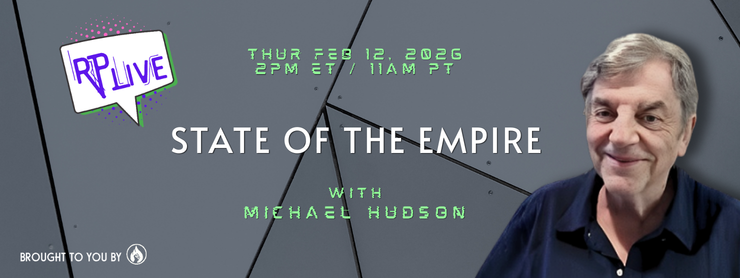
RP Live! State of the Empire
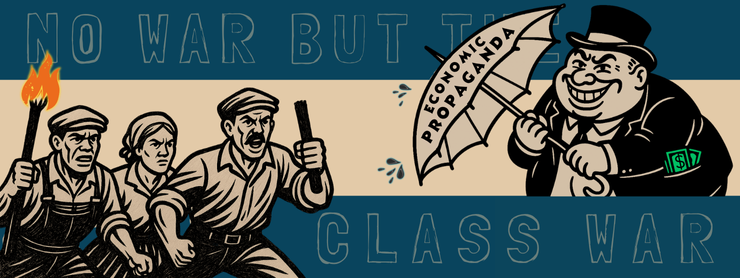
How the Elites Weaponize the Economic Illiteracy of the Working Class
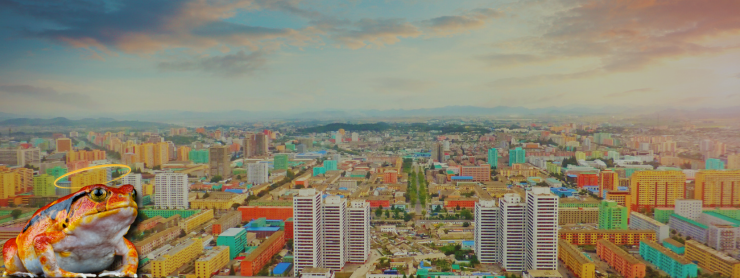
All Frogs Go To Heaven


